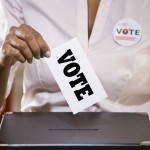 Research from Rice University found that female politicians were more likely to deliver on their campaign promises than their male peers, so you would think that society would be quite keen on electing female politicians. Of course, that’s not always the case, and Stanford research highlights some of the biases that continue to hold them back.
Research from Rice University found that female politicians were more likely to deliver on their campaign promises than their male peers, so you would think that society would be quite keen on electing female politicians. Of course, that’s not always the case, and Stanford research highlights some of the biases that continue to hold them back.
The study shows that we often have exaggerated beliefs about the electability of female candidates, which thus prompts us to plump for men instead. What’s more, we seem to do this even if we actually prefer the female candidate. This can be changed, however, when people are better informed about the real electoral prospects of female candidates.
The electability trap
The researchers conducted a survey during the 2020 Democratic presidential primary election, which was unique in that there were numerous competitive female options on the ballot paper.
“In most prior U.S. presidential primaries, all the candidates have been men. When there have been competitive women candidates, there has only been one, so it’s been very difficult to disentangle gender from all the other characteristics that specific candidates have,” the researchers explain.
The researchers surveyed around 1,000 probable Democratic voters to ask their views on the likelihood of a woman winning the election against Trump and who they would like to see as the next president.
The results show that 76% of respondents thought that it would be tougher for a woman to beat Trump, with the perceived lack of electability an oft. cited reason. Indeed, many thought that America was not yet ready for a female president, with gender biases likely to hamper any attempt made by a female candidate.
Switching preferences
There seemed to be a clear pattern emerging of people who would quite like to back a female candidate but ended up switching to a male candidate because they thought the man would be more electable.
It’s an example of what social scientists refer to as the “pragmatic bias”, which reflects less our own opinions and more our opinions of the biases other people may have that may hold a particular group back.
This runs the risk of creating an “electability trap”, with assumptions about group behavior then turning into a self-fulfilling prophecy that traps certain groups.
“One aspect of pragmatic bias that is especially pernicious is that people who themselves do not hold gender biases – and perhaps are even actively trying to further the advancement of women – might still act against women because of what they see around them. They may see that women candidates still contend with gender bias and conclude that a woman will not win and decide to vote for a man instead,” the researchers say.
Overcoming the bias
While women are generally underrepresented in American politics, data does nonetheless suggest that when women are on the ballot paper, they tend to get the same level of support as men. The researchers tested whether making this knowledge more widely available would sway people to support their preferred candidate, even if they were a woman.
In their first experiment, they found that simply reporting the number of voters who said they were ready for a female president was not sufficient to sway people. What did move the needle was solid evidence that men and women were equally electable.
“It might be more persuasive to tell people what others are actually doing rather than what others are thinking,” the researchers explain.
The key is for people to feel confident not only that people want a female candidate to succeed but that they will also be willing to vote for her at the ballot box.
“People base their sense of what is possible on what they have seen happen in the past. Often this makes a lot of sense, but it can also be an overly conservative force, slowing social changes that most people would like,” the researchers conclude. “In order for women to achieve equal access to political leadership, it is important for voters to update their sense of what is possible for women running for office. Until they do, women will face this extra barrier.”